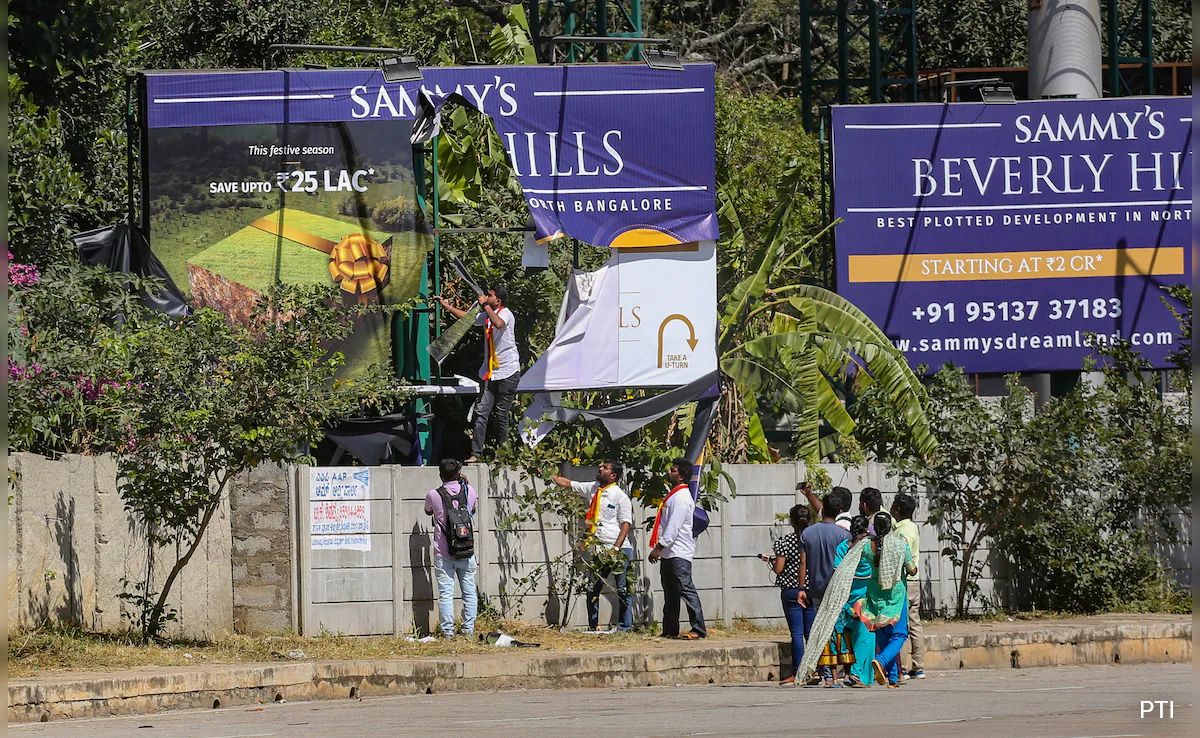
Two recent decisions by the Karnataka government have garnered significant national attention. First, 60% of all signage must be in the local Kannada language. Second, all multinational corporations (MNCs) must disclose the number of Kannada-speaking employees in their offices, with this data prominently displayed on signboards. Failure to comply may result in government action. The latter order, in particular, has sparked debate.
These decisions did not come about in a void. The Kannada linguistic identity holds considerable sway over a significant portion of the Kannada-speaking populace. The Congress government’s appeal to this sub-national linguistic identity comes just months before the Lok Sabha election, suggesting a broader electoral strategy. By shifting focus from national to regional issues, the Congress aims to replicate the blueprint that proved successful during the 2023 assembly elections in the state.
Through its five promises, the party localised the election discourse, resonating with Karnataka-specific concerns. Additionally, it underscores the underlying anxieties regarding jobs and linguistic identity among Kannada-speaking youth, a phenomenon not unique to Karnataka.
Politically, the Kannada linguistic identity serves as a potent tool for the Congress to counter the Bharatiya Janata Party’s (BJP) overarching pan-India narrative. While the BJP prioritises national issues such as the Ram Temple, Article 370, and the Uniform Civil Code, the Congress aims to leverage sub-national sentiments. This is not the first time the Congress has sought to foreground the Kannada linguistic identity. In 2018, a panel appointed by the Siddaramaiah government, ahead of state assembly elections, recommended the recognition of a separate Karnataka state flag.
Similarly, last year’s Amul versus Nandini controversy, positioned by the Congress as a battle to protect a Karnataka-based dairy brand, preceded the assembly elections. With the Lok Sabha elections looming, the recent language mandate signifies an attempt to tap into sub-national sentiments.
The language mandate comes close on the heels of Karnataka’s dispute with the centre over tax revenues, wherein leaders like Chief Minister Siddaramaiah and his deputy D.K. Shivakumar raised concerns about the Centre’s fund devolution, which they deemed unfair. Through the protests, the Karnataka government, along with their counterparts from Tamil Nadu and Kerala, alleged that southern states have not been given their rightful due.
Banking On Regional Identities
At a broader level, looking at the language diktat alongside the ongoing battle over revenue sharing, there seems to be a clear attempt to highlight regional identities.
While the timing of the Siddaramaiah government’s decision suggests there may be a link to the upcoming elections, the step is likely to find support among certain sections of the Kannada-speaking population in Bengaluru and other regions of the state. The Kannada linguistic identity has a strong support base. Over the past few years, several incidents have highlighted this.
In January last year, a student unfurled the Karnataka flag at his graduation ceremony in the UK. The video of the ceremony was widely shared on social media. In March 2023, a video clip of an argument between an auto driver and a passenger was widely circulated on X. The driver was seen asking passengers to talk in Kannada and refused to speak in Hindi. The video sparked debates around regional identities, especially in cosmopolitan cities like Bengaluru. Both these incidents underscored the extent of influence the Kannada linguistic identity has on the ground.
BJP, Congress Are On The Same Page
The response from the BJP and the Janata Dal (Secular) further underscores the importance of the Kannada identity. Both parties voted in favour of the bill mandating signboards to use at least 60% Kannada. BJP leaders R. Ashok and Suresh Kumar welcomed the bill, arguing that this was a much-needed step to protect Kannada.
In December 2023, when the Kannada Rakshana Vedike vandalised shops and establishments for not having Kannada signboards, the BJP and the Congress appeared to be on the same page. Both parties argued that the underlying demand to have more Kannada signboards was legitimate. The BJP went a step further and attacked the Congress for arresting Kannada activists who were involved in the vandalism. Former Chief Minister Basavaraj Bommai pinned the blame on the Congress for not formulating a policy mandating Kannada signboards. After the recent orders by the Karnataka government, the BJP targeted the Congress for nominating Ajay Maken, a non-Kannadiga, as the Rajya Sabha from the state.
Linguistic Identity Is A Strong Force
When it comes to sub-national linguistic politics, Karnataka is not alone. Similar demands to ‘safeguard’ languages and give preference to locals in jobs have emerged in other states too. In Maharashtra, the Shiv Sena grew out of the rising discontent among Marathi-speaking working class in Mumbai. The party has campaigned extensively for giving preference to locals when it comes to employment opportunities. The Haryana government too, in 2022, had mandated reservations for locals in private jobs, though the law was later struck down by the judiciary.
Increased support for sub-national identities is common in cosmopolitan regions that have witnessed an influx of ‘non-native’ migrants. In places like Bengaluru, Mumbai or Gurugram-regions that have seen and continue to see an influx of people from various parts of India-demands for the protection of the local language and preferential employment to ‘locals’ have been quite vocal. Studies have also shown that nativist feelings tend to intensify when there is an increased influx of non-native individuals.
Several factors are at play behind the Karnataka government’s language mandate.
Repeating the assembly election experience in the Lok Sabha polls has been the prime idea. The move also reflects the sentimental draw of the Kannada linguistic identity at the grassroots. Within Bengaluru city and in other regions of the state, there is a significant section of the population drawn towards this identity. This is why both the Congress and the BJP are actually on the same page on this issue. If anything, both parties are trying to outdo each other.
(The author is assistant professor of International Studies at FLAME University)
Disclaimer: These are the personal opinions of the author.

